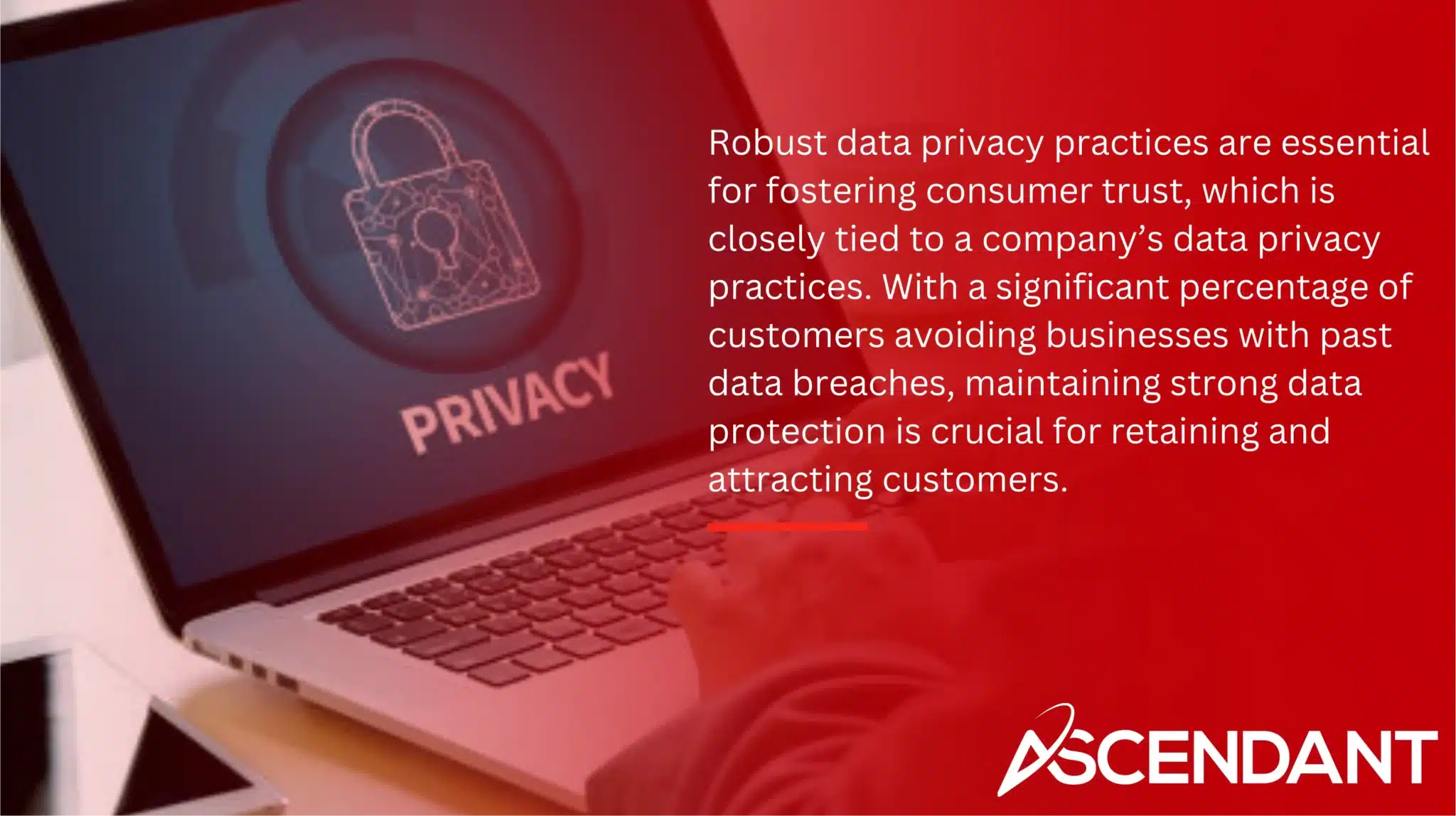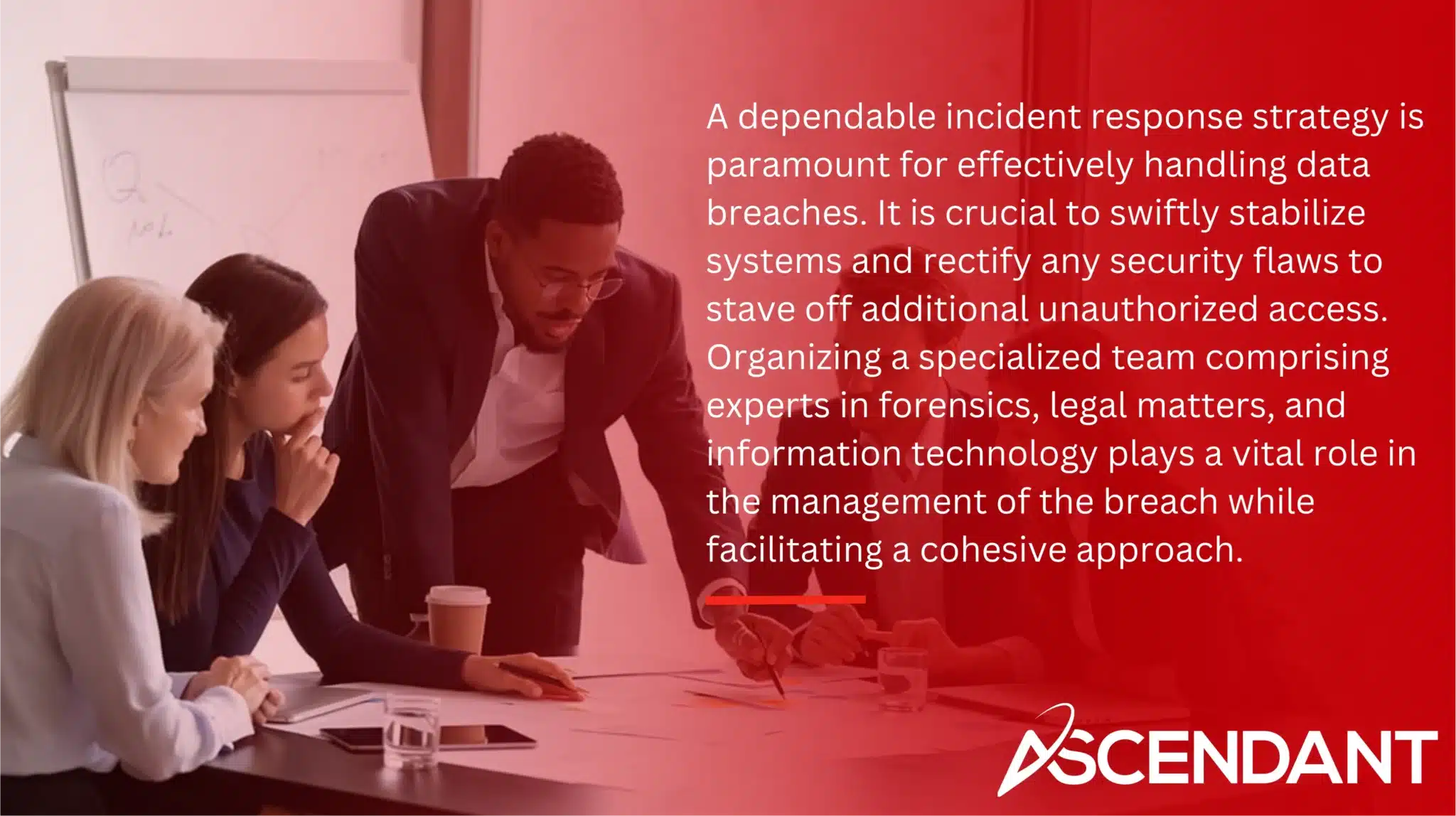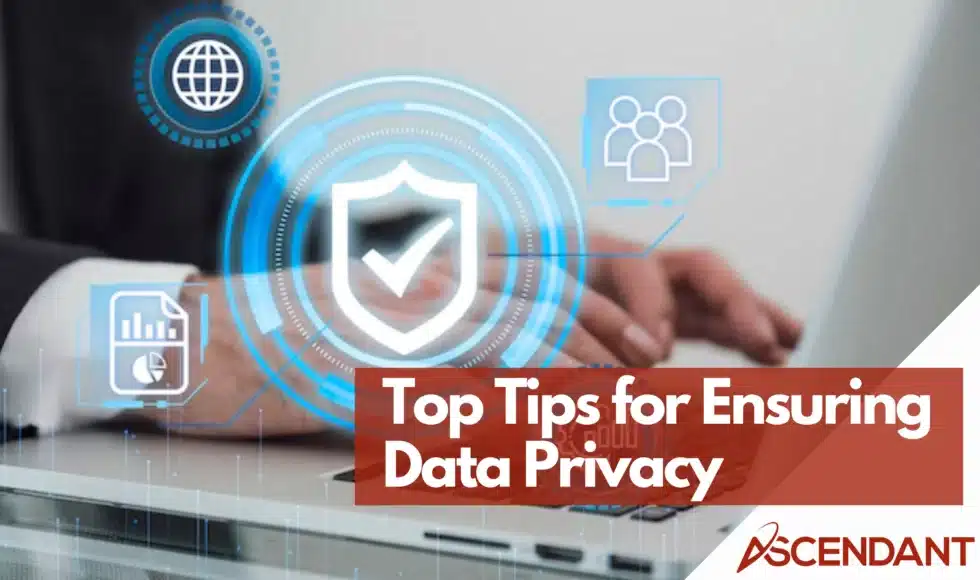Data privacy is the practice of ensuring that personal information is properly collected, stored, and used by organizations. It is crucial for maintaining confidentiality, complying with regulations, and safeguarding consumer trust. This article provides essential tips for ensuring data privacy, helping businesses protect sensitive data and build a trustworthy relationship with their customers.
Key Takeaways
- Data privacy involves the responsible handling of personal information, emphasizing consent, compliance, and consumer trust.
- Differentiating between data privacy, which focuses on individual rights, and data security, which aims to protect data from breaches, is crucial for comprehensive data protection strategies.
- Implementing best practices such as data minimization, transparency, and regular privacy audits is essential for safeguarding sensitive information and ensuring regulatory compliance.
Understanding Data Privacy
The safeguarding of sensitive data, which includes the procurement of consent and giving notice while meeting regulatory requirements, is a crucial aspect of data security known as data privacy. In today’s digital business landscape, where reliance on sensitive information is intense, securing this kind of data becomes essential. When personal details are mishandled, not only does it threaten individual privacy rights, but organizations may also incur substantial financial repercussions—with companies that have been breached average an 11% loss annually.
Managing how personally identifiable information (PII) along with other types of sensitive data is secured from exploitation forms the core purpose behind consumer trust retention in handling such delicate details both responsibly and ethically. The surge in volume for collected user info underscores the ever-growing importance that must be placed upon vigorous measures to protect said information.
To truly grasp what protects private user records entails vigilance beyond just gathering or storing particulars. It involves adherence to regulations regarding private matter custody coupled with employing strong protective systems against encroachment thus upholding consumer confidence by navigating their apprehension over sensitivity safeguards, cementing rapport between clientele and enterprise.
Key Differences Between Data Privacy and Data Security
Data security and data privacy, although frequently conflated, serve distinct functions in the realm of protecting information. The former concerns itself with legal rights related to personal information management, underlining the importance of obtaining consent and adhering to relevant regulations governing data privacy. It establishes protocols for how individuals’ personal data is gathered, disseminated, and utilized while granting them authority over their own information.
Conversely, securing data involves defending it from unauthorized exploitation and infiltration by employing technical safeguards. Security measures such as encryption techniques, firewall applications, and restrictions on system access are designed to fortify defenses against cyber threats that could compromise sensitive information. Impressive a secure system may be technologically, but if it mishandles individual’s private details then its efforts at maintaining user privacy fall short.
Grasping these two concepts separately is imperative for any enterprise seeking to develop robust strategies for safeguarding both the secrecy of consumer records and compliance with statutory requirements regarding privateness regulation—ultimately mitigating potential risks associated with compromising confidential databases through breaches or improper handling practices.
Importance of Data Privacy for Businesses

Robust data privacy practices are essential for fostering consumer trust, which is closely tied to a company’s data privacy practices. With a significant percentage of customers avoiding businesses with past data breaches, maintaining strong data protection is crucial for retaining and attracting customers. In fact, 78% of customers are more inclined to share their information with businesses they trust.
Moreover, compliance with data privacy regulations is not only a legal requirement, but also a business imperative that can affect profitability and reputation. Companies must determine applicable laws, identify data origin, and assess personal information to comply with data privacy regulations. Investing in data privacy can yield financial returns, with organizations potentially earning up to 2.7 times their investment in privacy practices.
Educating consumers about data privacy can also improve their engagement and trust in a business. Prioritizing data privacy helps businesses establish trust, boost customer loyalty, and safeguard their brand reputation.
Major Data Privacy Regulations
Regulations surrounding data privacy are crucial for the safeguarding of confidential information and maintaining democratic principles, as well as human rights. The General Data Protection Regulation (GDPR) stands out as a thoroughgoing law concerning data protection, necessitating that entities secure approval prior to gathering personal data and establish rigorous conditions pertaining to sensitive information. A failure in adherence to these regulations can attract substantial penalties reaching up to 20 million euros or 4% of a firm’s worldwide annual revenue.
The California Consumer Privacy Act (CCPA) within the United States grants individuals control over their personal data by allowing them insight into, access to, and options for erasure of such details held by companies. Canada echoes this approach through its Personal Information Protection and Electronic Documents Act (PIPEDA), which requires consent from individuals before collecting their private details while ensuring transparency about corporate policies on managing such content. Brazil’s Lei Geral de Proteço de Dados (LGPD), similar in nature to GDPR rules, extends across both government operations and private enterprises regulating the acquisition and handling of individual-level data.
Additional significant frameworks include South Africa’s Protection of Personal Information Act (POPI), America’s Health Insurance Portability & Accountability Act (HIPAA), along with Payment Card Industry Data Security Standard (PCI-DSS). Collectively they constitute national benchmarks for securing consumer privacy specificities relevant especially within healthcare finance domains.
Navigating compliance becomes multifaceted when contending with suppliers who operate internationally under distinct localized legal prescriptions related to security measures—a situation mandating continuous scrutiny by businesses engaged globally.
Data Privacy Best Practices
It is crucial to adopt best practices in data privacy for the protection of sensitive information and to maintain adherence with data privacy regulations. Important measures include minimizing data collection, being transparent with users about their information, and conducting frequent privacy audits.
Data Minimization
The practice of data minimization involves acquiring only the essential data required for a specific objective, thus mitigating risks associated with handling such information. By restricting the amount of collected data to what is strictly necessary, organizations can decrease the likelihood of experiencing a data breach and enhance their adherence to existing regulations governing consumer privacy.
Placing an emphasis on collecting minimal amounts of user information not only safeguards individual privacy, but also cultivates confidence among users. Consumers who are aware that any gathered data is managed cautiously tend to interact more comfortably with a business entity. Embracing principles of minimalism in regards to collecting users’ sensitive details streamlines its administration and lessens responsibilities related to storage and security measures.
By implementing practices centered around restrained collection policies regarding personal details, enterprises bolster their alignment with stringent standards laid out by various legal frameworks focusing on protecting personal identifiable material. Such responsible conduct augments faith amongst consumers while nourishing robust customer relationships built on mutual respect for private matters concerning informational assets.
Transparency with Users
Being forthright about the collection and application of consumer data greatly bolsters trust among consumers. It is crucial for companies to clearly communicate the type, intended use, and handling of collected data in order to establish a transparent rapport with users. Such clarity not only aligns with compliance obligations under data privacy regulations, but also mitigates privacy concerns by prioritizing the safeguarding of consumer privacy.
Companies that are candid about their data practices equip themselves to better protect personal information, laying down a robust bedrock for trust-building. Users tend more towards sharing their personal details when they have insight into its usage and assurance that measures are taken to preserve their privacy. Transparency stands as an essential element in ensuring data privacy while nurturing a constructive association with patrons.
Regular Privacy Audits
Ensuring data privacy and adhering to the latest data protection regulations necessitate regular privacy audits. These audits allow organizations to discover any vulnerabilities within their privacy protocols, enabling them to remedy such issues in a timely manner. This proactive approach helps maintain compliance with legal standards and preserves consumer confidence.
Periodic reviews offer a chance for enterprises to refine their existing privacy policies, integrate state-of-the-art privacy tools, and validate the efficacy of current data protection solutions. Such measures are crucial for early detection of potential data breaches, safeguarding customer confidentiality, and circumventing fiscal sanctions associated with violations.
By committing to routine evaluations of their approaches towards protecting sensitive information, companies underscore their dedication to mitigating privacy concerns. In turn, this fosters trust among consumers by showcasing an organization’s steadfast commitment to securing personal data against unauthorized access or misuse.
Protecting Sensitive Data
It is essential to preserve the privacy and security of sensitive data. By adopting best practices for data privacy, one can effectively secure sensitive information from unauthorized access and potential cybersecurity risks.
In this portion, we will discuss methods such as encryption techniques and access control measures that are vital in ensuring the protection of sensitive data.
Encryption Techniques
Utilizing encryption is key to safeguarding sensitive data, whether in transit or at rest. Symmetric encryption utilizes a single shared key for both locking and unlocking data, offering an efficient method especially when dealing with vast quantities of information. Conversely, asymmetric encryption involves two related keys—a public one for encoding and a private one for decoding—enhancing the security measures around delicate data.
Businesses that adopt strong encryption methods can guarantee that their sensitive data remains shielded from those without proper authorization while maintaining confidentiality. Adherence to this practice is crucial not only for meeting the demands of data privacy regulations, but also in upholding consumer trust through dedicated protection of their personal privacy.
In addressing concerns over consumer privacy, employing encryption serves as a critical component within broader data protection strategies by introducing an additional safeguard against unauthorized scrutiny or acquisition of stored or transmitted sensitive information.
Access Controls
It is essential to have well-defined access controls in place to significantly reduce the risk of unauthorized parties gaining entry to sensitive data. By implementing role-based access restrictions, an organization can secure its data by ensuring individuals only obtain information pertinent to their job functions. This strategy heightens security and diminishes the likelihood of internal actors misappropriating sensitive information.
To safeguard consumer privacy and adhere to existing data privacy regulations, stringent management policies governing who can access sensitive data must be established. Limiting this access plays a vital role in averting potential security breaches while maintaining adherence to core principles of data privacy. Robust control over who has the ability to view or handle this information is fundamental within a robust overall strategy for protecting critical datasets.
Handling Data Breaches

A dependable incident response strategy is paramount for effectively handling data breaches. It is crucial to swiftly stabilize systems and rectify any security flaws to stave off additional unauthorized access. Organizing a specialized team comprising experts in forensics, legal matters, and information technology plays a vital role in the management of the breach while facilitating a cohesive approach.
Promptly alerting both law enforcement agencies and those impacted by the breach stands as an integral component of dealing with such incidents. Adhering to local jurisdiction’s laws regarding notification obligations typically involves timely communication with affected parties along with providing details on protective steps available—for instance, complimentary credit monitoring services—to alleviate potential harm from the breach and help preserve trust among consumers.
For comprehensive understanding of how breaches occur—and for laying groundwork that impedes future compromises—meticulous documentation throughout investigation phases along with evidence preservation are fundamental practices. Coupled with this, constructing an effective plan to keep all relevant parties informed about both present conditions surrounding the breach as well as strategies employed for remedy can prove indispensable when managing these challenging circumstances efficiently. Thereby ensuring stringent protection measures are continuously upheld around sensitive data.
Role of Technology in Data Privacy
The role of technology in bolstering data protection and privacy is pivotal. Employing encryption techniques to secure sensitive information during storage or while it’s being sent prevents unauthorized individuals from gaining access. Businesses often rely on the Advanced Encryption Standard (AES), which the U.S. government endorses for its own use, showcasing AES as a dependable option for protecting sensitive data.
Artificial intelligence can augment the handling of personal data by pinpointing and shielding such information within different file formats, including those with audio and visual content. AI-powered privacy tools aid companies in automating their adherence to data privacy regulations, thus addressing consumer privacy concerns more efficiently.
By adopting technological solutions, enterprises are equipped to implement robust measures that ensure the safety of sensitive information. Doing so not only preserves consumer confidentiality but also fosters trust between businesses and their clientele.
Consumer Data Rights
The rights concerning consumer data bestow upon individuals the ability to effectively oversee their personal information. These include being informed about how organizations are using their personal details and possessing the authority to correct any erroneous data pertaining to them. This empowers consumers with dominion over their private information, bolstering trust in its responsible management.
Under certain stipulations, users can also demand that their personal data be eradicated, allowing them a measure of protection for their privacy. Through the principle of data portability, individuals have the convenience of transferring their information between diverse services, which amplifies user autonomy regarding control over one’s own data. These privileges are vital in safeguarding consumer privacy while ensuring adherence to stringent regulations governing data privacy.
Businesses that honor these rights regarding customer’s personal details demonstrate an investment in establishing trustworthy connections with clientele and signal a robust commitment towards upholding principles of data protection. Such practices engender positive relationships with customers and contribute substantially to advancing the framework that governs overall consumer privacy compliance.
Data Privacy Challenges
Safeguarding the confidentiality of data represents a considerable challenge for companies, particularly when navigating intricate supply chains that involve numerous vendors. Tackling and reducing the risks associated with data privacy in these circumstances can prove formidable, given that each vendor may operate under disparate practices related to data and distinct regulatory compliances.
Manual methodologies employed to evaluate third-party risk when processing data add layers of complexity to managing concerns about data privacy. Such methods are not only sluggish, but also susceptible to inaccuracies, thereby amplifying vulnerability to incidents involving breaches of sensitive information. Achieving uniformity in the evaluation criteria sourced from different assessments presents substantial difficulty in determining which third-party threats necessitate immediate attention.
Organizational cultural barriers might obstruct the adoption of extensive programs aimed at assessing risks linked with third parties. Resistance among staff members and other stakeholders toward embracing novel solutions dedicated to protecting one’s private information could thwart advancements in ensuring robust levels of privacy surrounding such information. While regularly performed audits serve as useful tools for spotting vulnerabilities within protective measures related to personal information (confirming adherence therewith), they require ample resource investment alongside profound organizational dedication.
Disregarding suppliers deemed low-risk on account of insufficient appraisal processes may result in unexpected complications threatening data privacy integrity—suggesting a comprehensive vetting process is imperative regardless perceived threat level—to guarantee pervasive safeguarding mechanisms concerning critical or delicate informational assets are enacted by businesses keen on proactively mitigating potential challenges faced whilst securing customer privateness assurances through compliance fortification efforts.
Summary
Ensuring the secure handling and safeguarding of sensitive data is a pivotal aspect of preserving data privacy. It’s vital to distinguish between data privacy and data security while recognizing the significance that data privacy holds for commercial entities, as well as adhering to key regulations related to consumer information protection. To enhance efforts in securing user information, employing best practices such as reducing the amount of collected personal details, maintaining transparency with users about their information usage, and conducting consistent audits relating to privacy can be greatly beneficial.
With businesses facing intricate challenges associated with protecting customer information rights, utilizing advanced technologies for this purpose are fundamental steps towards upholding both trust among consumers and regulatory compliance. By proactively tackling issues around preserving private info through holistic solutions aimed at its defense, companies will be better equipped to keep critical customer details under wraps while simultaneously establishing a reputable bond built upon confidence with those they serve. Companies dedicated to stringent adherence in these domains guarantee not only fortified defense against risks but also foster an environment where they can prosper securely within today’s technology-driven marketplace.
Frequently Asked Questions
What is the difference between data privacy and data security?
Data privacy focuses on individuals’ rights regarding their personal information, whereas data security is concerned with protecting that data from unauthorized access and breaches.
Understanding this distinction is crucial for effectively managing both aspects.
Why is data privacy important for businesses?
Data privacy is vital for businesses as it fosters consumer trust, ensures compliance with legal regulations, and protects against potential financial and reputational harm from data breaches.
What are some major data privacy regulations?
Major data privacy regulations include GDPR, CCPA, PIPEDA, LGPD, POPI, HIPAA, and PCI-DSS, each establishing crucial requirements for data protection and consumer rights.
Understanding these regulations is essential for compliance and safeguarding personal information.
What is data minimization?
Data minimization is the practice of collecting only the essential data required for a specific purpose, which effectively reduces the risks associated with data handling. This approach not only safeguards privacy but also promotes responsible data management.
How can businesses handle data breaches effectively?
To handle data breaches effectively, businesses must implement a well-defined incident response plan that includes securing systems promptly, notifying affected individuals and law enforcement, and offering protective measures like credit monitoring.
This proactive approach mitigates damage and helps restore trust.


